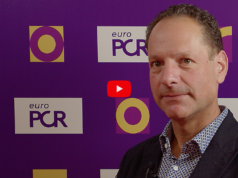
2019 saw the 30th anniversary of EuroPCR, with 11,206 participants gathering in Paris. William Wijns, PCR chair, shares his perspective on how it has evolved since 1989 and the reasons for its success, and explains why healthcare professionals should sign up to the newly drafted PCR Charter.
What have been the key milestones for the PCR Courses over the past 30 years?
The first key milestone was the creation of the Course in Toulouse in 1989 by Professor Jean Marco and his colleague Jean Fajadet. It was intended to be one of the first international courses on interventional cardiology, entirely in the English language. That fact may not seem remarkable nowadays, but at the time the discipline was considered by many to be unworthy of development, so in some ways it was revolutionary. By 1997, the number of participants had increased so significantly that the Course had to move to Paris.
A number of milestones were reached in the 2000s, among them the launch of PCRonline.com. In addition, EuroIntervention became the official journal, and the European Association of Percutaneous Cardiovascular Interventions (EAPCI) was created, and named the Course as its official congress. During the same decade, there was a rapid expansion to support the specific needs of patients worldwide, and six PCR Courses were created—AsiaPCR-SingLIVE (now AICT-AsiaPCR), PCR London Valves, GulfPCR-GIM, AfricaPCR, PCR-CIT China Chengdu Valves, and PCR Tokyo Valves.
What are the main factors that have contributed to the success of PCR Courses?
Firstly, their relevance to daily practice and the fact they are built by and for all community members—that is, not just interventional cardiologists, but all the heart team: physicians, cardiac surgeons, imaging specialists, nurses, and allied professionals. PCR is complementary to national societies; we provide a structure and open platform through which they can reach out and interact on an international scale. Our practical approach to clinical problem solving has also contributed, as proved by the increasing numbers participating in our workshops.
PCR has always attached great importance to knowledge transmission. Our wide range of learning tools are inspired by the vision that Jean Marco had to improve education. LIVE demonstrations were implemented from the outset and remain a highly educational technique for sharing the skills of seasoned operators. Many other session formats have evolved over the years, adapted as required by the subject matter to meet expectations in teaching methods and learning outcomes.
Also, although it is difficult to quantify, I feel the positive and enthusiastic spirit of PCR has also contributed. Freedom of speech has been at the core of what we do since the beginning, and participants often say how much they enjoy and benefit from the encouragement they are given to raise their hands and share their own experience.
How can PCR ensure it continues to remain relevant?
The world has changed tremendously over the last 30 years, and at PCR we work ceaselessly to adapt accordingly. Young healthcare practitioners help us to keep our ears to the ground and are actively involved in building programmes that ensure their needs are met. Keeping participants up-to-date with innovation continues to be a priority and will ensure our continued relevance.
The digital shift has already enabled us to provide additional opportunities that are complementary to the Courses. As well as Course resources and scientific content available on PCRonline.com, the PCR-EAPCI Textbook today includes 110 online chapters, and is continuously updated by its editors, authors, and community members. And for the past few years, tailor-made two-day PCR seminars have been also offered, as well as much-appreciated webinars on essential practical topics. The range of solutions PCR provides will continue to adapt to evolving needs worldwide.
What can you tell us about the PCR Charter?
The charter was drafted to formulate our essence and inspire future generations and announced at EuroPCR 2019. It collected nearly 300 signatures in the first four days. After a 30-year journey, it seemed the right time to give voice to what we are—to express what our community stands for, and what our values are. It will be used to encourage reflection and inspire healthcare professionals to reinforce the sharing of knowledge, experience and practice, not only during Courses or within the framework of an established mentor-fellow relationship, but on a regular basis between all peers. Those wishing to find out more are invited to do so on www.pcr-charter.com.
William Wijns is at National University of Ireland, Galway, Ireland.













